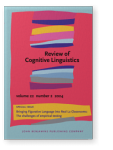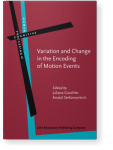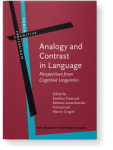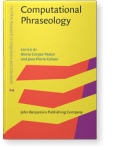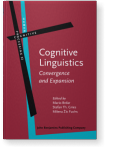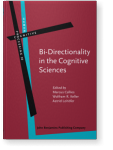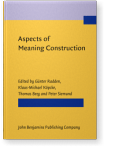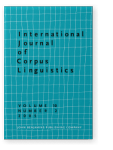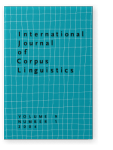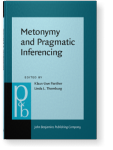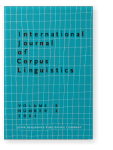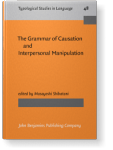Anatol Stefanowitsch
List of John Benjamins publications for which Anatol Stefanowitsch plays a role.
Journal
Title
Variation and Change in the Encoding of Motion Events
Edited by Juliana Goschler and Anatol Stefanowitsch
[Human Cognitive Processing, 41] 2013. x, 251 pp.
Subjects Cognition and language | Cognitive linguistics | Historical linguistics | Semantics | Sociolinguistics and Dialectology | Syntax | Theoretical linguistics
2022 Chapter 7. Complex prepositions of analogy and contrast in English: A corpus-based analysis Analogy and Contrast in Language: Perspectives from Cognitive Linguistics, Krawczak, Karolina, Barbara Lewandowska-Tomaszczyk and Marcin Grygiel (eds.), pp. 193–244 | Chapter
Complex prepositions of the form [P (Det) N P] and [(P) ADJ to] (e.g., in addition to, with respect to, in accordance with, due to, pursuant to) undoubtedly belong to formal registers that Basil Bernstein calls “elaborated code” and that John Lucy refers to as “intellectualized language” – they… read more
2020 Too big to fail but big enough to pay for their mistakes: A collostructional analysis of the patterns [ too ADJ to V] and [ADJ enough to V] Computational Phraseology, Corpas Pastor, Gloria and Jean-Pierre Colson (eds.), pp. 247–272 | Chapter
In this paper, we illustrate the usefulness of the family of methods collectively known as Collostructional Analysis for phraseological research. Investigating two patterns, [too ADJ to V] and [ADJ enough to V], we show how a technique originally developed for the investigation of words and… read more
2013 Introduction: Beyond typology: The encoding of motion events across time and varieties Variation and Change in the Encoding of Motion Events, Goschler, Juliana and Anatol Stefanowitsch (eds.), pp. 1–14 | Article
2013 Variation and change in English path verbs and constructions: Usage patterns and conceptual structure Variation and Change in the Encoding of Motion Events, Goschler, Juliana and Anatol Stefanowitsch (eds.), pp. 223–244 | Article
English is classified as a satellite-framed language with manner-conflating verbs, but it also has a substantial number of (usually Romance) pathconflating verbs that are used transitively with a locative direct object. In this chapter, I address two aspects of these verbs. Using the case of enter,… read more
2011 Cognitive linguistics meets the corpus Cognitive Linguistics: Convergence and Expansion, Brdar, Mario, Stefan Th. Gries and Milena Žic Fuchs (eds.), pp. 257–290 | Article
A first empirical turn in cognitive linguistics (CL) occurred in the mid–1990s, when researchers began to apply psycholinguistic methods to CL research questions, which quickly gained widespread acceptance in the field. More recently, a number of CL researchers have turned to corpus-linguistic… read more
2011 Cognitive linguistics as a cognitive science Bi-Directionality in the Cognitive Sciences: Avenues, challenges, and limitations, Callies, Marcus, Wolfram R. Keller and Astrid Lohöfer (eds.), pp. 295–310 | Article
Cognitive linguistics is on its way to becoming a cognitive science, but a number of problems remain. The relationship between cognitive linguistics and the core cognitive sciences (psychology and neurology) must be clarified: cognitive linguists can selectively import models and methods from these… read more
2007 Collocational overlap can guide metaphor interpretation Aspects of Meaning Construction, Radden, Günter, Klaus-Michael Köpcke, Thomas Berg and Peter Siemund (eds.), pp. 143–167 | Article
In this chapter, I argue that information about properties that are metaphorically projected between semantic domains is accessible in the form of collocational overlap between lexical items representing these domains. This shows that the statistical properties of natural language can guide human… read more
2007 Brutal Brits and persuasive Americans: Variety-specifc meaning construction in the into-causative Aspects of Meaning Construction, Radden, Günter, Klaus-Michael Köpcke, Thomas Berg and Peter Siemund (eds.), pp. 265–281 | Article
“England and America are two nations divided by a common language.”(George Bernard Shaw)Adopting a construction-based view of language (Goldberg 1995), we demonstrate that it is possible to uncover differences between British and American English at the lexicosyntactic level, showing that the… read more
2005 The function of metaphor: Developing a corpus-based perspective International Journal of Corpus Linguistics 10:2, pp. 161–198 | Article
This paper presents a corpus-based approach to investigating the function of metaphor, specifically to the question whether the use of metaphorical language is motivated primarily by stylistic considerations or by cognitive principles. The paper focuses on concepts that can be expressed… read more
2004 Extending collostructional analysis: A corpus-based perspective on `alternations' International Journal of Corpus Linguistics 9:1, pp. 97–129 | Article
This paper introduces an extension of distinctive-collocate analysis that takes into account grammatical structure and is specifically geared to investigating pairs of semantically similar grammatical constructions and the lexemes that occur in them. The method, referred to as… read more
2003 A construction-based approach to indirect speech acts Metonymy and Pragmatic Inferencing, Panther, Klaus-Uwe and Linda L. Thornburg (eds.), pp. 105–126 | Article
2003 Collostructions: Investigating the interaction of words and constructions International Journal of Corpus Linguistics 8:2, pp. 209–243 | Article
This paper introduces an extension of collocational analysis that takes into account grammatical structure and is specifically geared to investigating the interaction of lexemes and the grammatical constructions associated with them. The method is framed in a construction-based approach to… read more
2002 Causative constructions in Akawaio The Grammar of Causation and Interpersonal Manipulation, Shibatani, Masayoshi (ed.), pp. 341–371 | Article
